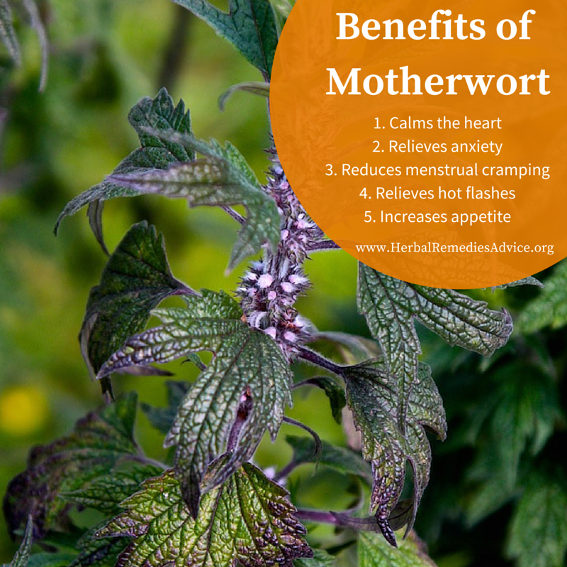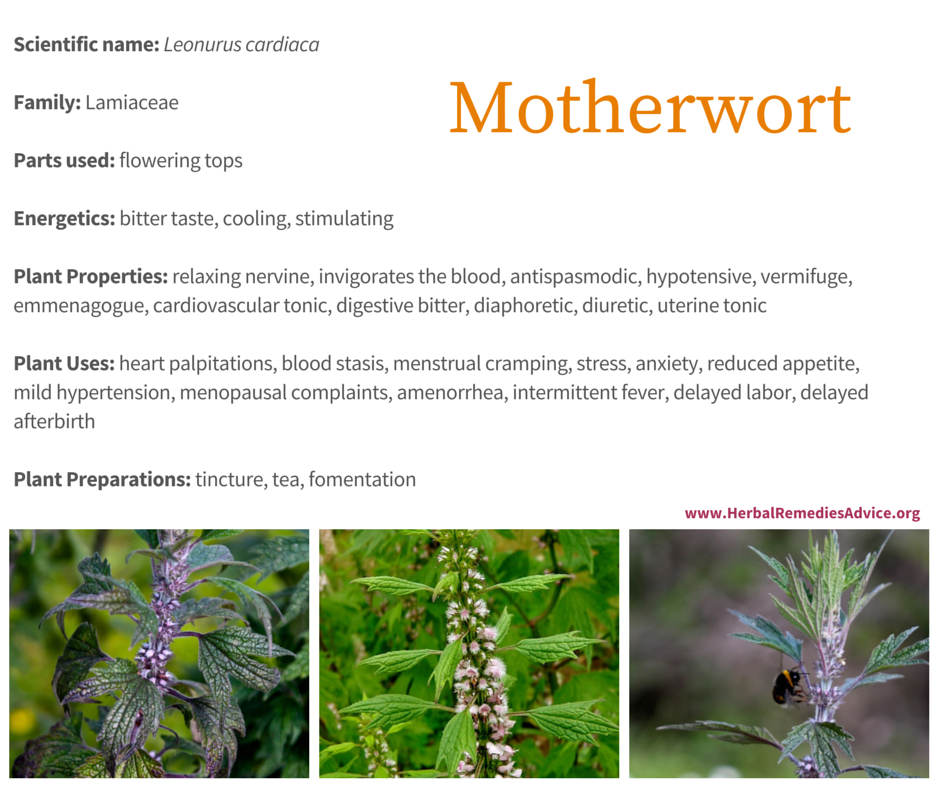Get weekly tips, recipes, and my Herbal Jumpstart e-course! Sign up for free today.

Benefits of Motherwort
Share this! |
|
Benefits of Motherwort for Calming the Heart and Relieving Anxiety
When we talk about the heart in modern times we most often think of the muscle in our chest that is responsible for pumping blood throughout our bodies. In older times, and for many herbalists today, however, the heart is more commonly associated with emotional and spiritual qualities. The terms of being “heart broken,” to “lose heart,” to put your “heart and soul” into something or being “sick of heart” illustrate this association.
Motherwort’s actions beautifully show us the connection between the physical and spiritual heart. It is often used when there is a rapid, fluttering, or pounding heartbeat (palpitations) associated with anxiety or nervousness. Through this, we can see that it acts on the physical heart by decreasing palpitations and mild hypertension while also acting on the spiritual heart to soothe and calm anxiety. An additional benefit of motherwort is that it is calming without being overly sedating.
There is no better Herb to drive Melancholly Vapors from the Heart, to strengthen it, and make a merry cheerful blith soul.
~Nicholas Culpeper, The English Physician - 1652
Heart palpitations are often felt in people who have hyperthyroidism. A common formula used by many herbalists includes motherwort, lemon balm, and bugleweed for heart palpitations associated with hyperthyroidism.
Motherwort is a mild hypotensive herb and can be used to decrease hypertension, especially when it is associated with extreme emotions. In one clinical study, an extract of motherwort was given to fifty patients with hypertension accompanied by anxiety and sleep disorders. After 28 days of use, 80% of the patients reported significant to moderate benefits in their anxiety and depression levels.1
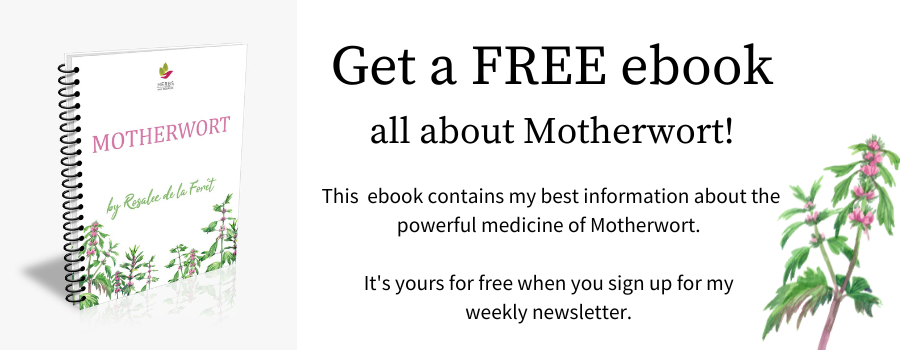
Benefits of Motherwort as a Women’s Tonic
As the common name suggests, motherwort has long been associated with aiding mothers and women. It has a strong history of use in both Europe and Asia. Chinese physicians have reportedly used their own species of Motherwort (Leonurus siberica) for menstrual problems since at least 100 A.D.2
[Motherwort] calms and soothes the nerves for overworked mothers who could use some mothering themselves.
~ Deborah Frances, 2014 Medicines from the Earth
Benefits of Motherwort for Painful and Delayed Menstruation
Motherwort is an emmenagogue, which is an herb that is used to promote delayed menstruation. Emmenagogues like motherwort are indicated when there is scanty menstruation or cramps associated with delayed menstruation. Many herbalists recommend using it regularly to tone the uterus, which reduces menstrual cramping in the future. While many herbalists recommend it as a tincture, King’s Dispensary recommends it as a fomentation over the abdomen to relieve painful or suppressed menstruation.3
Benefits of Motherwort for Delayed Labor and Delayed Afterbirth
Motherwort has long been praised for its ability to help women with delayed labor or to help dispel the afterbirth postpartum. Professor John King and Finley Ellingwood (Eclectic herbalists) reported excellent results with motherwort for helping to expel the suppressed lochia (uterine secretions after childbirth).4
Benefits of Motherwort for Fevers and Other Respiratory Ailments
Historically, motherwort was used for intermittent fever diseases such as typhoid.4 Peter Holmes recommends it for bronchitis, coughing with white sputum, and wheezing.5
Benefits of Motherwort for Edema and Kidney Stagnation
Motherwort strengthens the kidneys and acts as a mild diuretic. It can be used for edema that is associated with kidney insufficiency.6
Benefits of Motherwort for Increasing the Appetite
Motherwort is extremely bitter and, like most bitter herbs, it can help stimulate digestion. Consider combining it with other pleasantly aromatic mints in a tincture and using a few drops before meals. It is especially indicated for loss of appetite due to anxiety or nervousness.
Common Motherwort Combination
Motherwort is commonly used in formulas, depending on its intended use. Here are some common combinations:
- For anxiety, combine motherwort with passionflower (Passiflora incarnata) or pasqueflower (Pulsatilla occidentalis).
- For the heart, combine motherwort with hawthorn (Crataegus spp.) and rose (Rosa spp.).
- For hot flashes and anxiety associated with menopause, combine motherwort with black cohosh (Actaea racemosa).
- For dysmenorrhea (painful menstruation), combine motherwort with Dang Gui (Angelica sinensis).
- For loss of appetite due to nerves, combine motherwort with chamomile (Matricaria recutita) and/or lemon balm (Melissa officinalis).
I use a mixture of Hawthorn berry, flower, and leaf with Cactus and Motherwort for anxiety-induced heart problems.
~David Winston, Differential Treatment of Depression
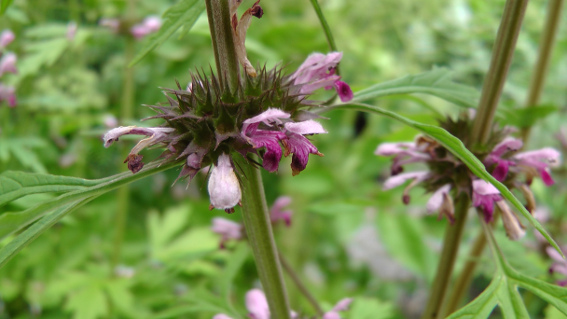
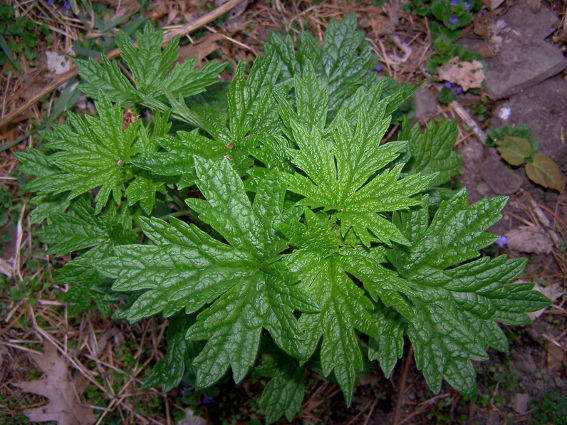
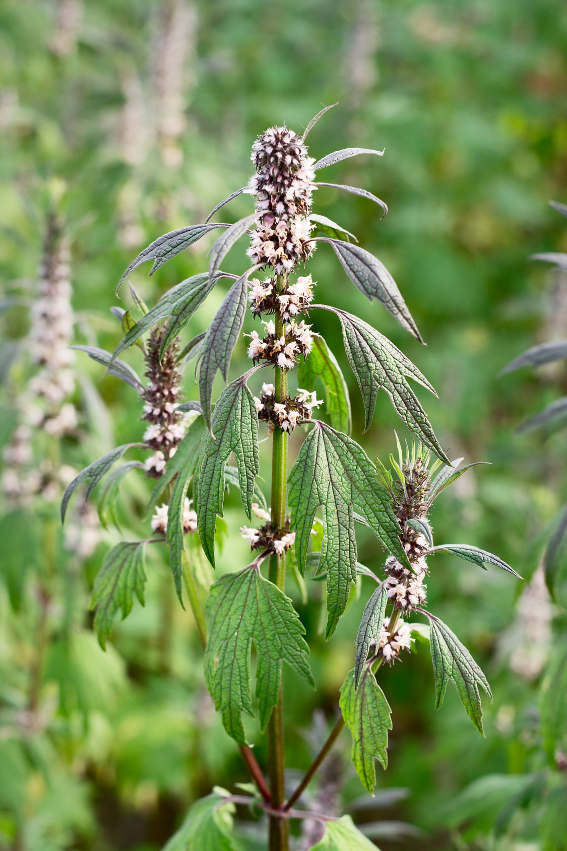
Motherwort Uses
If harvesting motherwort yourself, consider using gloves – it can be quite spiky!
Because motherwort is so bitter, most herbalists prefer to use it as a tincture rather than a tea. It is harvested when it is in full flower and often tinctured while fresh.
Dosage:
- Motherwort herb tincture: 2-4 mL three times a day
- Motherwort tea: 9-30 grams dried herb
Motherwort Side Effects
Many herbalists caution against using motherwort if there is menstrual flooding.
Motherwort should not be used during pregnancy except under the guidance of an experienced practitioner and only just before and after labor. It is always contraindicated during the first trimester, second trimester, and most of the third trimester.
Motherwort has not been conclusively verified as safe during breastfeeding.
Many herbalists say that motherwort has its best activity made as a tincture of the fresh plant.
The Motherwort Herb
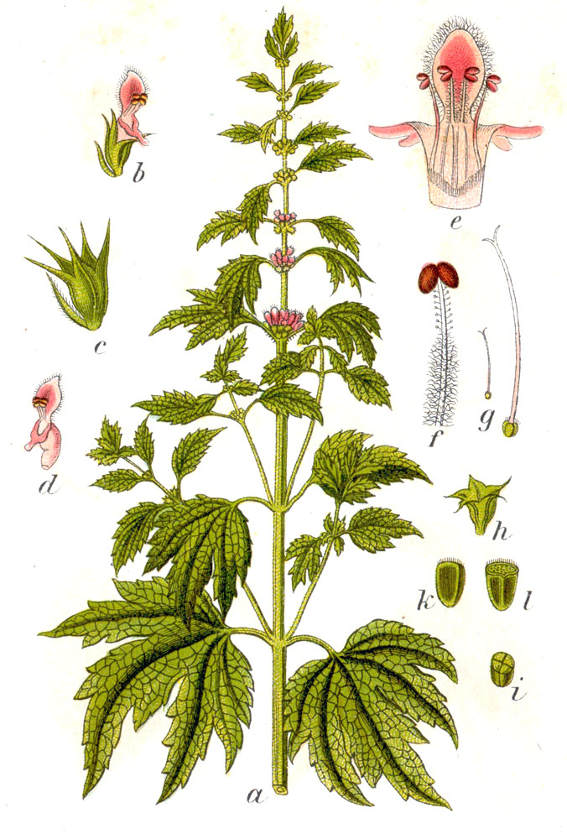
Motherwort is a member of the mint family with opposite leaves and square stems. The leaves are palmately lobed with long petioles.
The first year leaves grow in a basal rosette.
The flowers are lip shaped and have a delicate pink color. They appear in the leaf axils on the upper part of the plant.
It grows voraciously in the garden and can reach up to 6 feet high.
Summary of the Benefits of Motherwort
Modern ideas of the body tend to view the physical and emotional self as two separate entities. In our culture of western medicine, if you have a physical problem you see an M.D. If you have an emotional problem you see a therapist or psychologist. Motherwort reminds us that there is no real separation between the physical and emotional self. It both strengthens the physical heart and calms the emotional heart. And while it is famous for acting on the heart and the uterus, motherwort, like many herbs, has a variety of uses, including supporting digestion, kidney health, and the fever process.
Citations
Click to show/hide.
Rosalee is an herbalist and author of the bestselling book Alchemy of Herbs: Transform Everyday Ingredients Into Foods & Remedies That Healand co-author of the bestselling book Wild Remedies: How to Forage Healing Foods and Craft Your Own Herbal Medicine. She's a registered herbalist with the American Herbalist Guild and has taught thousands of students through her online courses. Read about how Rosalee went from having a terminal illness to being a bestselling author in her full story here.
